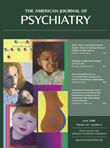Offspring of Depressed Parents: 20 Years Later
Abstract
Objective: This study was a 20-year follow-up of offspring of depressed and nondepressed parents to determine the magnitude and continuity of the risk of parental depression to the offspring. Method: The authors followed 151 offspring of moderately to severely depressed parents or nonpsychiatrically ill comparison subjects for about 20 years, to a mean age of 35 years. Four interviews and diagnostic assessments from childhood or adolescence to adulthood were conducted by assessors blind to the parents’ clinical status or the offspring’s previous history. Final best-estimate diagnoses were also made by blinded psychologists or psychiatrists. Results: The risks for anxiety disorders, major depression, and substance dependence were approximately three times as high in the offspring of depressed parents as in the offspring of nondepressed parents. Social impairment was also greater. The period of highest incidence for major depressive disorder remained between ages 15 and 20 years, largely in females. The early onset of disorder seen in the high-risk group was not offset by a later onset in the low-risk group as they matured. Higher rates of medical problems and mortality in the offspring of depressed parents were beginning to emerge as the offspring entered middle age. Conclusions: The offspring of depressed parents constitute a high-risk group for psychiatric and medical problems, which begin early and continue through adulthood. Early detection seems warranted.



